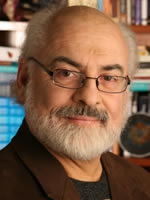Frank Macchia: Baptized in the Spirit
Throughout his book Macchia sustains a reverence for sacred Scripture, always giving it the first and last word in any argument. He also interacts expertly and insightfully with a wide range of thinkers and theologians, including other Pentecostal scholars as well as patristic and contemporary ecumenical sources. He often includes opponents of Pentecostalism, frequently offering robust rebuttals. Special affinities with Barth are sometimes apparent. Most importantly, Macchia explores how the doctrine of Spirit baptism may inform an overall Christian worldview rather than limiting it to any single esoteric experience. In this respect he admirably achieves his anticipated “vision of the whole.” He also carefully and faithfully draws on thinkers around the world and is therefore not only ecumenical but truly global in his perspective.
A possible criticism concerning this book could come from those who perhaps fear that Macchia’s enlargement of Spirit baptism risks losing its classical Pentecostal distinctiveness. After all, he basically admits that the Evangelicals (and others) who insist on Spirit baptism in a context of conversion-initiation are at least partially correct. And his emphasis on the eschatological Spirit’s indwelling and infilling of all creation could be construed as a concession to the thought of Moltmann and others regarding God’s ultimate interdependent relationship with the world. Similarly, his connection of Spirit baptism with the Kingdom and with the dynamics and ethics of love implies a certain Wesleyan-Holiness construct often used against Pentecostals. Macchia might reply that the main elements of these emphases are not so much incorrect as incomplete—as is a Pentecostalism stressing Spirit baptism only as speaking in tongues or spiritual gifts! The key for me is that he never emphasizes the above themes in exclusion of charismatic gifting and/or vocational empowerment but always in a context of inclusion and integration. What we have here therefore is not a diminishment of distinctive Pentecostalism but rather an authentic embellishment of its inner reality for a broader perspective. Perhaps imperative for Pentecostals accepting this line of thought will be an intentional effort to balance its both/and elements rather than being thrown into any either/or positions.
Macchia himself is particularly adept at balance (always a challenge for anyone, especially Pentecostals!). An evident example is his rigorous refutation of the philosophy of religious pluralism. He skillfully argues that Christ’s role as Spirit Baptizer indicates the Church is the locus of the Spirit’s work, but also that the Spirit still works in the wider religious world because the Kingdom extends in gracious ways beyond ecclesial borders. Pluralist equalizations of all religions are thereby refuted without falling into the equal and opposite error of exclusivist incriminations. Accordingly, Macchia adds his voice to others assisting Pentecostals in advancing toward a mature, moderate theology of religions.



